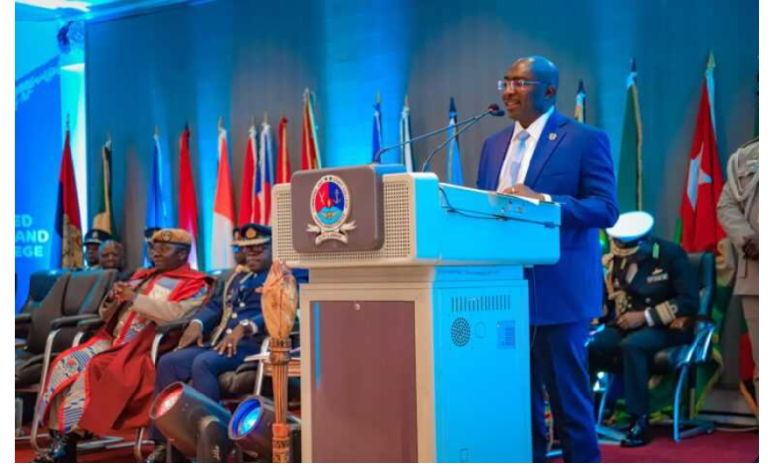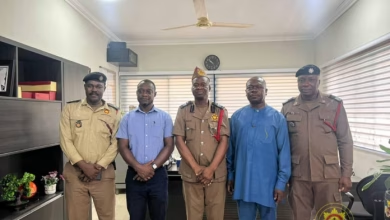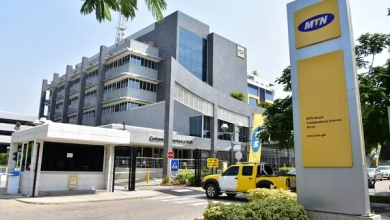Bawumia Warns Security Agencies About Misinformation and Disinformation Threats

- Bawumia urged graduates to use their insights for global security.
- He highlighted the importance of cross-border collaboration.
- Graduates were advised to leverage their new connections.
Vice President Dr. Mahamudu Bawumia has issued a stern warning about the growing impact of misinformation and disinformation on national development, particularly as Ghana approaches its Presidential and Parliamentary elections in December. He emphasized the need for heightened vigilance among all stakeholders, including the Military and other security agencies, to prevent the influence of fake and misleading information that could lead to misguided actions.
Addressing attendees at the Joint Graduation Ceremony of the Ghana Armed Forces Command and Staff College Course 45 and the Master of Science in Defence and International Politics in Accra on August 23, 2024, Vice President Bawumia commended the Ghana Armed Forces for their crucial role in upholding Ghana’s democratic standards. He urged them to continue protecting the nation’s hard-won reputation as a democratic model in the West African region.
Dr. Bawumia highlighted that the upcoming elections, despite their historically free and fair nature, have often faced security challenges and, in some cases, led to fatalities. He acknowledged the professionalism, discipline, and commitment of the Armed Forces in managing these challenges, stressing that their role remains vital in maintaining order and ensuring the integrity of the electoral process.
The Vice President pointed out the current era of intense misinformation and disinformation campaigns targeting the general public, the Armed Forces, and the government. He warned that such tactics could potentially destabilize the country and affect the broader security of the West African region.
He urged the Armed Forces to apply the insights gained from their training on democratic control of the military to conduct themselves with professionalism and integrity. Maintaining stability and upholding democratic principles, he said, are essential to safeguarding Ghana’s democracy and regional security.
Vice President Dr. Mahamudu Bawumia, who also serves as Chairman of the Police Council, acknowledged the rapidly evolving nature of warfare and conflict, particularly within the West African subregion. He praised the Control Board, the Military High Command, and the Management of the Ghana Armed Forces Command and Staff College for their proactive approach in adapting the college’s curriculum to address contemporary challenges. By introducing courses that reflect the changing dynamics of modern conflict, they are ensuring that the institution remains relevant and effective in preparing military leaders for current and future security scenarios.
Vice President Dr. Mahamudu Bawumia highlighted the growing prevalence of misinformation and disinformation, noting how these tactics have increasingly influenced public opinion and eroded support for established governments. He emphasized that these deceptive activities have become a significant challenge, generating both support for malicious actors and dissatisfaction with central authorities.
In response to these evolving threats, Dr. Bawumia lauded the introduction of the Multi-Domain Operations module into the curriculum at the Ghana Armed Forces Command and Staff College. He underscored that this new module is both timely and crucial, providing graduating officers with essential training to address contemporary security challenges. The module aims to equip them with advanced knowledge and skills to develop effective countermeasures against modern threats.
By integrating this module, the College is ensuring that military leaders are prepared to confront the complex nature of modern warfare, which increasingly includes non-traditional threats such as sophisticated propaganda and digital manipulation. Dr. Bawumia emphasized that this approach is vital for enhancing the capabilities of the Armed Forces, as well as sister security agencies and allied forces, enabling them to more effectively defend Ghana and its friendly nations against evolving security threats.
The Vice President called on the graduates, who represent 17 countries including Ghana, to leverage the insights and relationships they have developed during their course to collaboratively enhance the peace and security of Africa and the broader global community.
He expressed confidence that the training modules and seminars provided a solid foundation for building cross-border relationships and understanding the importance of joint efforts in achieving national and operational security goals. The Vice President emphasized that these experiences highlight the significance of collaborative operations and the roles played by allies, multinational agencies, sister security agencies, and government organizations in reaching shared objectives.
Dr. Bawumia encouraged the graduates to build on the connections they have made during their studies and use these relationships to foster greater cooperation. He also urged them to apply the knowledge they have gained to make a significant impact in their future roles, contributing to the advancement of the Ghana Armed Forces and their respective military institutions and organizations.






